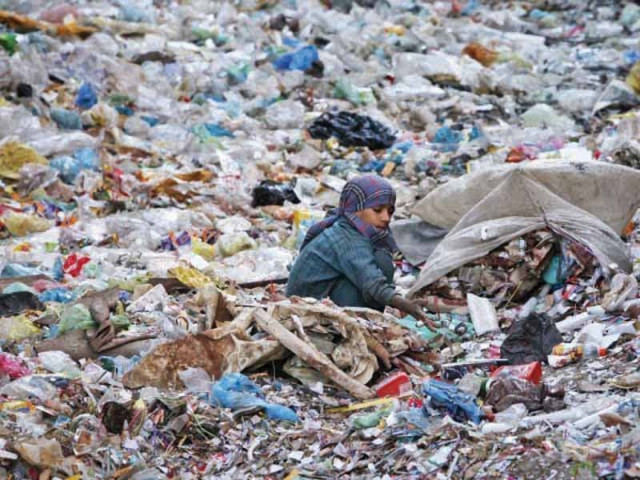PFA restricts public from re-using plastic bottles
The usage of BPA–based chemicals are banned for food product packaging in various developed countries

PHOTO: REUTERS
The used plastic bottles can now only be sent to recycling industry as the provincial food watchdog has decided to take strict action against companies and industries involved in refilling of the used bottles.
PFA Director General Noorul Amin Mengal said the plastic bottles have a chemical called Bisphenol A (commonly known as BPA), which could cause cancer and other dangerous diseases. The authority would take strict action against restaurants and shop owners if it found empty plastic bottles with in their premises, he warned.
Bisphenol A (BPA)
BPA is an organic synthetic compound that is being used commercially for different industrial purposes since 1957. It is a colourless solid that is soluble in organic solvents, but poorly soluble in water. In various developed countries, the usage of BPA based chemicals has been banned for food products packaging.
In 2012, the US Food and Drug Administration (FDA) banned the use of BPA in baby bottles.
According to the European Food Safety Authority (EFSA), BPA posed no health risk to consumers of any age group (including unborn children, infants and adolescents) at current exposure levels. But in 2017, European Chemicals Agency concluded that BPA should be listed as a substance of very high concern due to its properties as endocrine disruptor.
The Endocrine Society said in 2015 that the results of on-going laboratory research gave grounds for concern about the potential hazards of endocrine-disrupting chemicals – including BPA – in the environment, and that on the basis of the precautionary principle these substances should continue to be assessed and tightly regulated.
According to 2016 review of the literature, the potential harms caused by BPA were a topic of scientific debate and that further investigation was a priority because of the association between BPA exposure and adverse human health effects including reproductive and developmental effects and metabolic disease.
In 2006, the US Government sponsored an assessment of the scientific literature on BPA. Thirty-eight experts in fields involved with bisphenol A gathered in Chapel Hill, North Carolina to review several hundred studies on BPA, many conducted by members of the group.
At the end of the meeting, the group issued the Chapel Hill Consensus Statement, which stated that average BPA levels in people were above those that cause harm to many animals in laboratory experiments.
Over the internet, one can easily find that many online retail stores sell PET water bottles under different brand names with a claim of ‘BPA FREE’ material as it has become a matter of health and environment around the world.
Published in The Express Tribune, July 18th, 2017.



















COMMENTS
Comments are moderated and generally will be posted if they are on-topic and not abusive.
For more information, please see our Comments FAQ